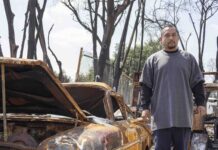Pierce College veterans grow in the military and beyond
Katie Hirahoka was running on two hours of sleep, but as a new mother with an energetic, wobbling toddler to take care of, this wasn’t unusual. As she paced around the United States Army center in Germany, Hirahoka didn’t give much thought to her lack of rest or the fast-approaching deadline for her final exams in her college courses.
She couldn’t spend her bandwidth on those worries, because more than 3,000 miles away, soldiers in Hirahoka’s unit were trekking through the arid terrain of Afghanistan. It was the summer of 2021, and the soldiers were relying on Hirahoka, who was their staff sergeant, to help coordinate their mission as they pulled refugees out from a country teetering into chaos.
“It was hard to balance it all, but my unit was deployed and I had to focus on my job,” Hirahoka said. “But then I would come back from my missions and I would reunite with my son, and all those sacrifices felt like they were for something.”
Hirahoka, 28, spent eight years in the army, before leaving to focus on higher education and support her son, who is now 5 years old, as a single parent. She is now a mathematics and economics major at Pierce College, with hopes to transfer to a four-year university in the fall. Although Hirahoka is no longer in the service, she stays connected with the military community through the Pierce Veterans Club and the Veterans Resource Center.
“School is a huge priority for me, but it’s not easy going to college either,” said Hirahoka, who was the president of the Veterans Club last year. “My friends from the service are a really good support.”
Veterans make up approximately 3% of students at Pierce College, and according to the U.S. Census, there are more than 2.6 million military families in the United States. Many of these families create community and support one another, but they also face challenges such as frequent travel and mental health struggles, according to Shelley MacDermid Wadsworth, the director of the Military Family Research Institute at Purdue University. In a 2023 survey of military families by the non-profit Military Family Advisory Network, 59% of respondents said they experience loneliness.
“Military families face all the same challenges that civilian families do, and there are things that are over and above for them, especially because military families are generally quite young,” MacDermid Wadsworth said. “But military families are very adaptable.”
For David Shats, an engineering major at Pierce College and a former U.S. Marine, the decision to enlist took time. He would occasionally eye a military recruiter’s glossy business card that sat on his desk, unmoved among the clutter. At first, he couldn’t understand why he hadn’t thrown it away. Most of the men in his family had served in the Russian military before immigrating to the United States, but the prospect of Shats donning a uniform seemed to be more of a far-away whisper than a plan.
Still, the idea lingered as Shats stumbled apathetically through his community college classes. So he picked up the phone. Maybe it was to make his grandfather proud. Maybe he didn’t realize the toll it would take on his mother. More than anything, Shats enlisted to find a path for himself.
“The last thought every single person has before they sign the dotted line is, ‘Fuck it, I’m doing this, I’m climbing this mountain,’” said Shats, 24. “My mom cried when I told her, but they all came around eventually. She now has a sticker, ‘Proud parent of a U.S. Marine,’ and what once devastated her is now her biggest pride and joy.”
Shats served for four years and ended his time in the Marines as a corporal. He spent most of that time deployed in Japan and South Korea. Sixteen hours ahead and half of the globe away from his family and friends in Los Angeles, Shats said the distance was a challenge. But being a Marine was worth it for him, because it taught him to be responsible and disciplined, he said.
“All the men in my family basically had the point of view that they think all men should serve, and that it’s part of character building, and part of me has started to agree with that,” Shats said. “The person I was before and the person I am now, is at its core, it’s the same, but it’s a flipped image.”
Hirahoka, Shats and many other veteran students at Pierce use the Veterans Resource Center on campus to access basic needs resources, get assistance with financial aid and academics, and come together. The resources that the center provides can make a significant difference, considering that one in five military families experience food insecurity, according to the Military Family Advisory Network survey.
Curtis Smith, the coordinator of the Veterans Resource Center at Pierce, said he “thoroughly enjoys” supporting veteran students in his role. Smith began his role last year.
“Our veteran students have a lot of life experience and really contribute to the campus,” Smith said. “The VRC is an avenue for them to get together and hang out with other veterans, regardless of which branch they’re from.”
Beyond the Veterans Resource Center, much of the support for veterans on campus is provided by other veterans, according to Hirahoka, Shats and Smith. The Veterans Club, which Hirahoka previously ran, helps fill that gap. Hirahoka said most of the items in the Veterans Resource Center are brought in by students.
“I noticed that it was just as hard in the rest of the world as it was in the service, for veterans, with a lack of support,” Hirahoka said. “The Vet Club is a way to have a higher level of community.”
Throughout the challenges she has faced both in the military and as a civilian, Hirahoka has used her creativity as an outlet for growth and self-love. She painted murals during her deployment, and she continues to create art, primarily acrylic paintings. She mostly paints the people she sees around her, including her son and her friends.
“There is so much beauty in people, and there are so many stories to tell through my painting,” Hirahoka said.
Hirahoka plans to transfer to a four-year university in the fall, and she hopes to eventually pursue a PhD. She said her advice to other Pierce veterans is to reach out to each other, join the Veterans Club and show love to themselves.
“One thing I think the world lacks is a lot of love,” Hirahoka said. “Something I’m focusing on a lot lately, as I’ve grown as a person, is showing love to myself and the people around me.”



